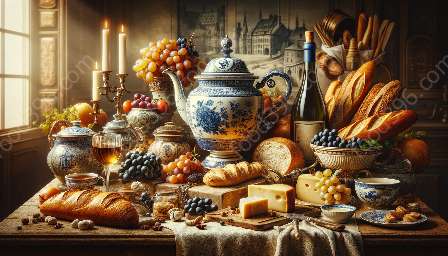French cuisine is renowned for its sophistication, rich flavors, and culinary diversity. Its evolution has been shaped by a myriad of influences, including historical events, cultural exchanges, and geographic landscapes. This topic cluster explores the multifaceted elements that have contributed to the development of French cuisine, delving into the historical roots and contemporary manifestations of these culinary influences.
French Cuisine History
The history of French cuisine is deeply intertwined with the country's cultural and social developments. From the early Gauls to present-day France, the evolution of French culinary traditions reflects a rich tapestry of influences.
Early Influences
The history of French cuisine can be traced back to the ancient Gauls, who cultivated and harvested indigenous ingredients from the fertile land. These early influences laid the foundation for the culinary practices that would later merge with subsequent cultural and historical developments.
Roman Influence
During the Roman Empire's rule over Gaul, the introduction of new ingredients such as olive oil, wine, and spices significantly impacted the local cuisine. The blending of Roman culinary techniques with indigenous Gaulish ingredients marked the beginning of a gastronomic fusion that would define French cuisine for centuries to come.
Medieval Era
The Middle Ages brought further changes to French culinary practices, as trade and commerce expanded, leading to the incorporation of exotic spices, dried fruits, and new cooking methods. The feudal system also influenced the development of French gastronomy, with the nobility indulging in elaborate feasts while the common people relied on simpler fare.
Renaissance and Enlightenment
The Renaissance and Enlightenment periods ushered in an era of culinary refinement, as French cuisine experienced a renaissance of its own. Influenced by Italian and Spanish culinary traditions, French chefs embraced novel techniques and embraced the use of diverse ingredients. The era also saw the birth of renowned French culinary institutions, laying the groundwork for the country's future gastronomic prominence.
Modern Era
The modern era of French cuisine has been shaped by a confluence of global influences. Waves of immigration, colonial expansion, and international trade have introduced a spectrum of flavors and cooking styles to France, leading to the evolution of fusion cuisine and the proliferation of multicultural culinary expressions.
Cuisine History
French cuisine has not developed in isolation but has been influenced and has, in turn, influenced various culinary traditions around the world. Understanding the history of cuisine in a broader context sheds light on the interconnectedness of global gastronomy and the enduring legacy of French culinary innovations.
Cultural Exchange
French cuisine has been shaped by centuries of cultural exchange with neighboring countries and distant lands. The amalgamation of ingredients, cooking techniques, and culinary sensibilities from diverse cultures has enriched the fabric of French gastronomy, reflecting a dynamic interplay of influences.
Geographic Influences
The geographical diversity of France has also exerted a profound influence on its culinary landscape. From the coastal regions of Normandy and Brittany to the fertile valleys of Provence and the vineyard-laden hills of Bordeaux, each region's unique terroir has contributed distinct flavors and specialties to the overarching tapestry of French cuisine.
Global Fusion
As the world has become increasingly interconnected, French cuisine has evolved to embrace global flavors and culinary innovations. The fusion of international ingredients and cooking styles has propelled French gastronomy into a realm of cross-cultural creativity, where traditional French dishes coexist with inventive adaptations and multicultural interpretations.
Culinary Evolution
The evolution of French cuisine reflects a dynamic interplay of historical, cultural, and geographic influences, shaping a culinary tradition that continues to captivate and inspire food enthusiasts around the world. From ancient roots to modern-day fusion, the diverse influences on French cuisine have endowed it with a complexity and vibrancy that encapsulates the essence of its rich and storied history.

